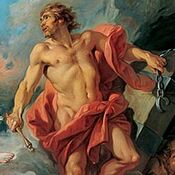ENGL 2111
World Literature 1
World Literature I focuses on textual studies of the major genres of this period, epic and tragedy, how those genres influenced later literary works, and how they portray humanist issues throughout the Greek and Roman national literary traditions and beyond.
ENGL 2111 demonstrates the continued relevance of ancient works in understanding ourselves as “humans.” Major works covered will include Gilgamesh, the Iliad, the Odyssey, and works by Sophocles, Euripides, and Ovid. Since any survey course has much more literature than one semester-long class can cover, we will attempt to cover only a few works in as much detail as time allows, rather than many works only cursorily.
Sections
| Term | CRN | Class | Day and Time | Room |
|---|---|---|---|---|
| Fall 2023 | 82297 | ENGL 2111.05 | Online ⚠️ | - |
| 82830 | ENGL 2111.11 | Online ⚠️ | - | |
| Summer 2023 | 50116 | ENGL 2111.04 | Online ⚠️ | - |
| Spring 2023 | 20877 | ENGL 2111.05 | «Canceled» | |
| 21895 | ENGL 2111.01 | Online ⚠️ | - | |
| 22512 | ENGL 2111.13 | Online ⚠️ | - | |
| Fall 2022 | 80506 | ENGL 2111.03 | MW 12:30-13:45 | SOAL-216 |
| 81312 | ENGL 2111.05 | Online ⚠️ | - | |
| 82063 | ENGL 2111.18 | Online ⚠️ | - | |
| Summer 2022 | 55542 | ENGL 2111.07 | Online ⚠️ | - |
| Spring 2022 | 23909 | ENGL 2111.05 | MW 9:30-10:45 | SoAL-206 |
| 25264 | ENGL 2111.01 | Online ⚠️ | D2L ➭ | |
| Fall 2021 | 83647 | ENGL 2111.03 | MW 11-12:15 | SoAL-218 |
| 83634 | ENGL 2111.15 | Online ⚠️ | D2L ➭ | |
| Spring 2021 | 20503 | ENGL 2111.21 | Online ⚠️ | D2L ➭ |
| 21304 | ENGL 2111.06 | Online ⚠️ 2nd | D2L ➭ | |
| Fall 2020 | 80701 | ENGL 2111.03 | MW 11-12:15 (H-OL ⚠️) | TEB-231 |
| 80702 | ENGL 2111.04 | TR 11-12:15 (H-OL ⚠️) | SoAL-222 | |
| Spring 2020 | 25677 | ENGL 2111.11 | MW 11-12:15 | CoAS-210 |
This is a Core IMPACTS course that is part of the Humanities area
Core IMPACTS refers to the core curriculum, which provides students with essential knowledge in foundational academic areas. This course will help master course content and support students’ broad academic and career goals.
This course should direct students toward a broad Orienting Question:
- How do I interpret the human experience through creative, linguistic, and philosophical works?
Completion of this course should enable students to meet the following Learning Outcome:
- Students will effectively analyze and interpret the meaning, cultural significance, and ethical implications of literary/philosophical texts or of works in the visual/performing arts.
Course content, activities, and exercises in this course should help students develop the following Career-Ready Competencies:
- Ethical Reasoning
- Information Literacy
- Intercultural Competence
Resources
- Epic Poetry: The Epic of Gilgamesh; Homer’s Iliad and Odyssey
- Greek Tragedy: Sophocles’ Oedipus the King; Euripides’ Medea
- Ovid’s Metamorphoses
Sample Exam Questions
- Gilgamesh and the Homeric epics are concerned with periods of expansion: i.e., when peoples are struggling to build their nations, both literally and ideologically. Discuss similarities in these three works in what seems to be necessary in building a strong nation and national identity.
- Discuss and illustrate the theme of hospitality and its importance to the social structure in the Odyssey.
- Discuss the implications of Odysseus as narrator in Book 9-12 of the Odyssey.
- In the Poetics, Aristotle cites Oedipus the King as exemplifying the best of tragedy. Discuss how Oedipus the King defines and illustrates what we know as tragedy.
- Many have called Euripides an “iconoclast,” not in a literal sense, but suggesting that his work seems to break the conservative icons of his society; for example: tradition, hierarchy, belief, etc. Examine his iconoclasm citing specific instances from Medea.
- Scholars frequently define an Ovidian concept of love as one that lives “close to the flesh,” suggesting that love in Ovid’s work is really just lust or desire. Discuss the implications of this view on those who love and those who are loved in at least three tales from The Metamorphoses.

